Thanks for the memory: Rewriting history
ANALYSIS: Historian reveals how the present controls the past.
WATCH: NBR columnist Nevil Gibson speaks with Calida Stuart-Menteath.
ANALYSIS: Historian reveals how the present controls the past.
WATCH: NBR columnist Nevil Gibson speaks with Calida Stuart-Menteath.
Sir Ridley Scott, the filmmaker, is as acerbic to his critics as Elon Musk is to advertisers defunding X. Scott preceded Musk’s ‘GFY’ moment with comments about nitpicking historians: “I ask: ‘Excuse me, mate, were you there? No? Well, shut the f… up then’.”
The nitpickers over Scott’s latest biopic, Napoleon, went ahead, anyway. The Hollywood tradition of egregious distortions of history is well documented, so I won’t repeat them here.
As Scott asserts, mostly they are forgivable or understandable if they add drama or suspense, exaggerate, or simplify events, or merely provide better entertainment.
The practice of looking at the past through the prism of modern-day morality can add to the sum of knowledge, if done with skill.
Two short scenes in Napoleon stand out for their use of dramatic effect. Napoleon did not attend the execution of Marie-Antoinette in 1792; but this immediately places the story in its historical context. A year later, Napoleon, then aged just 24, masterminds the defeat of the British during the siege of Toulon, a port on the Mediterranean Sea. As a result, he is promoted to brigadier-general for his military prowess.
The second scene is Napoleon ordering his troops to fire at the pyramids near Cairo. This is Scott’s shorthand for the Egyptian campaign against the British. Napoleon is also seen defacing a mummy. This depicts Napoleon as ignorant and dismissive of an ancient civilisation.
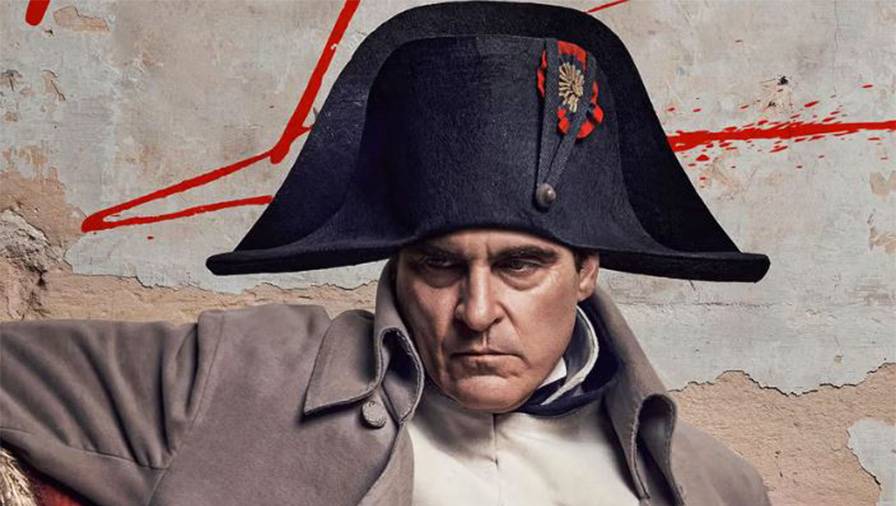
Joaquin Phoenix as Napoleon. Photo: Sony Pictures.
In fact, Napoleon was highly educated, having attended the top school in Paris. His army included 167 scholars, including architects, historians, and geographers, as Napoleon’s intentions were more than military. He could be said to be the founder of Egyptology as well as bringing Egypt into the modern world.
None of this should put anyone off seeing Napoleon. It has heaps of impressive battle scenes as well as embellishments about Napoleon’s private life, which are unlikely to convince anyone that these are more accurate than dozens of researched biographies.
The role of historians, as opposed to those who create entertainment, is to curate the past, as Rowan Light puts it in Why Memory Matters, for its potential as a guide to the future: “its strangeness and distinctiveness, its peculiarity, complexity and messiness…”
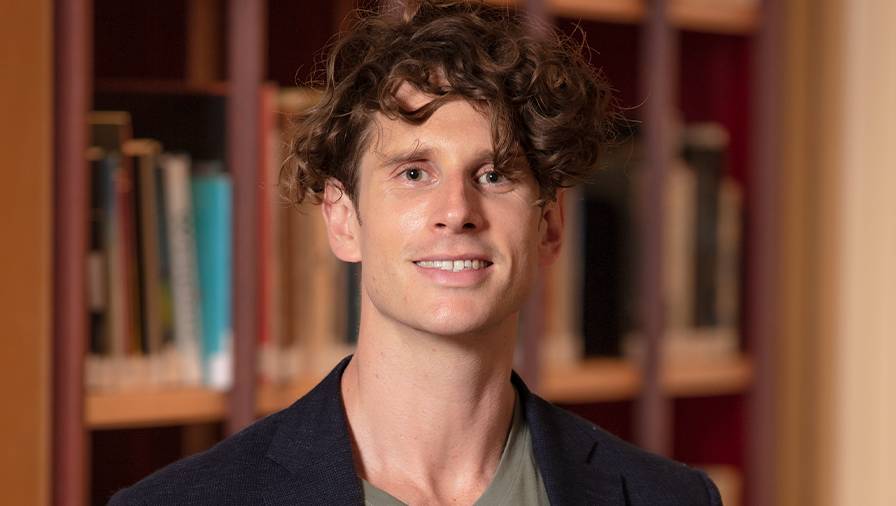
Dr Rowan Light.
Light is a curator at the Auckland War Memorial Museum and lecturer in history at the University of Auckland. His first book was Anzac Nations, a study of how war commemorations in Australia and New Zealand have changed over more than a century.
His new book is about collective memory and how it interacts with historical practice. If history is what happened in the past, collective memory is centred on the present: “It is the recall of the past to respond to changing circumstances.”
Historians speak of a ‘memory boom’ to describe the fixation in modern life of remembering, or “new ways of relating to the past posed from the crucibles of memory, such as loss, change, absence, and grief”. Mostly, these involve violent events that are the cause of misery and suffering, wars being the primary example.
In this definition, “memory is not so much about what we remember of the past but how” [emphasis in the original]. Modern conflicts, such as in Gaza and Ukraine, have deep historical roots, with differing traditions of how past events have been commemorated. In the case of Ukraine, which has had plenty of wars and invasions in its past, the most defining memory is the Holodomor – Stalin’s enforced starvation of millions of farmers in the 1930s.
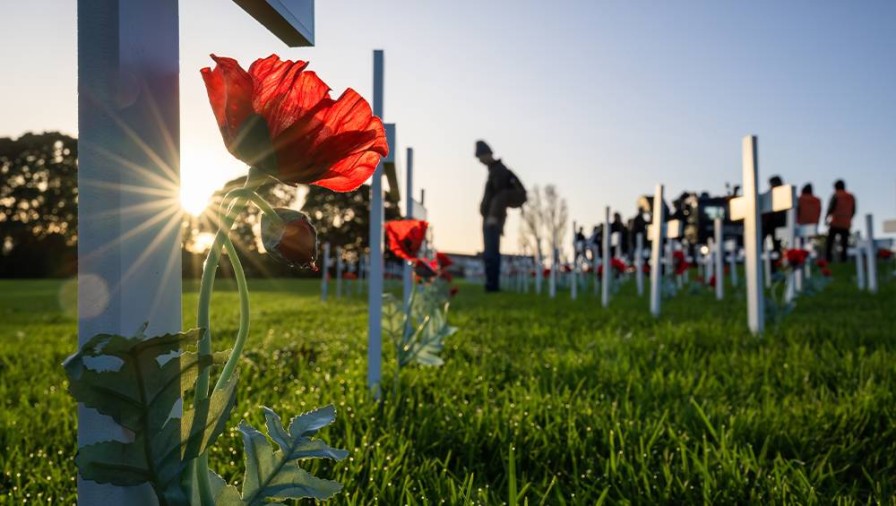
In New Zealand, the most obvious examples are Anzac Day and Waitangi Day, both of which have been commemorated in changing ways since the events they’re based on.
Why Memory Matters goes straight into the contentious area of how collective memories are at odds with historical practice. Contrary to George Orwell’s contention that historians should stop those in power lying about the past, they became apologists – the “history is written by victors” complaint.
The emergence of oral history in the 1980s provided the pushback, with survivors or eyewitnesses telling of traumatic or hidden events. This challenge to the dispassionate role of historians sparked the ‘memory boom’ and has become a key feature in a revisionist version of New Zealand’s colonial past.
Light produces four case studies to illustrate changing interpretations, and subsequent events that have resulted in acts of vandalism, the removal of statues, rewritten memorials, and other examples of public outrage. (This week’s defacement of a Te Papa exhibit is the latest in a long list based on people enacting their versions of ‘collective memory’.)
One case involves Massey University professor Michael Belgrave’s Dancing with the King: The rise and fall of the King Country (2017). A reviewer, Martin Fisher, criticised Belgrave for failing to prioritise Waikato Māori memories of Rangiaowhia, a crucial battle in the New Zealand Wars, as a brutal attack on innocent non-combatants.
Fisher said the account lacked ‘balance’ and Belgrave riposted that the historical evidence should not be tainted by contemporary politics. Versions of this event are still debated with Labour MP Arena Williams, for example, describing it was an atrocity (pahuatanga) where unarmed men, women, and children were burnt in a church at an unfortified pa.
Without going into details, this pahuatanga became a powerful ‘collective memory’ despite being strongly contested by those who saw it, namely colonial troops and Māori survivors.
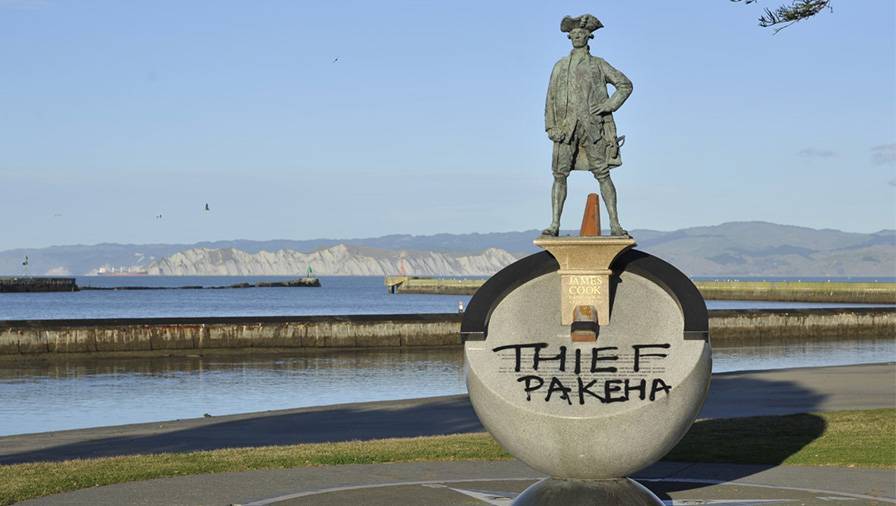
Collective memories are also in conflict over Captain James Cook, the 18th century’s greatest explorer, whose encounters with Māori have led him to be branded as a ‘coloniser’ and murderer, leading to calls for statues of him to be removed and acts of vandalism against them, notably in Gisborne, where he made his first landfall in 1769.
A third case study involves the minor but far-reaching decision by a community newspaper, the Devonport Flagstaff, to drop the English names of the suburb’s two defining physical features, Mt Victoria and North Head. Instead, they are solely referred to as Takarunga and Maungauika, respectively, which came under the control of Auckland’s Tupuna Maunga Authority in 2014.
Maunga, of course, rank highest in Māori collective memory as part of an individual’s pepeha. The move was controversial because Devonport was the first and only British naval base in this remote part of the Empire. It therefore qualified, Light suggests, as a ‘memory map of empire’ and closely associated with Queen Victoria herself.
It did not go unnoticed that the newspaper’s title was Devonport’s original imperial name, or that its most famous Māori citizen, Eruera Patuone, was buried on Mt Victoria. He, like many local Māori, claimed a special connection to ‘Wikitoria’. Her name remains on the main street and cinema.
As a resident, I must say the Flagstaff’s renaming decision hasn’t caught on in local use as much as intended, nor has the policy of restoring the maunga to its treeless precolonial state. Incidentally, Light – who was brought up in Devonport – provides a piece of trivia related to Napoleon that I didn’t know. In 1835, a member of the Ngai Tai tribe returned to Maungauika with a weeping willow sapling from St Helena, where Napoleon spent his last days in exile.
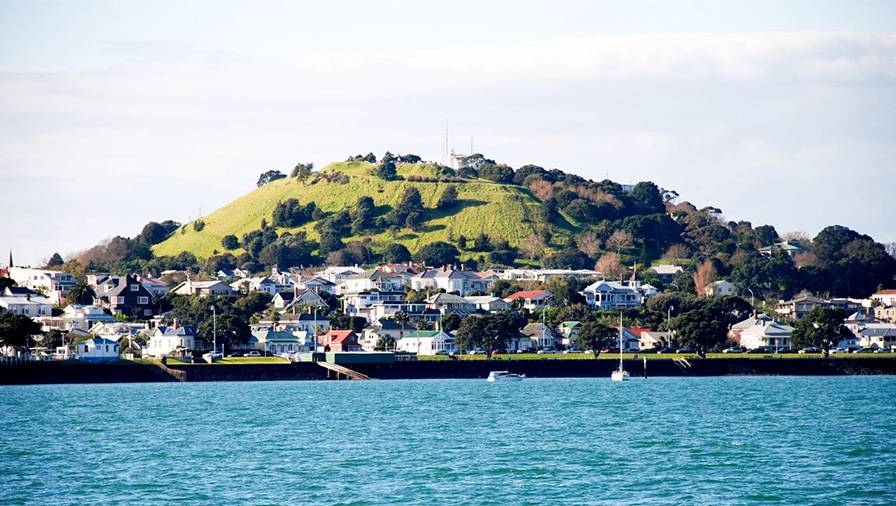
Mount Victoria Takarunga, Devonport.
The final case study in Light’s collection is the controversy that raged in Titahi Bay a month after the Christchurch mosque shootings in 2019. Major Simon Strombom, a distinguished veteran of New Zealand’s and the UN’s military presence in the Middle East and Afghanistan from 2000 to 2006, suggested an Islamic prayer at the RSA’s Anzac Day commemoration.
Light’s account is a classic example of how one group’s memory of the past – in this case New Zealanders dying in foreign wars, including Muslim countries – ran up against the most recent event that seared public memory, the deadly attack on 91 worshippers, killing 51 and injuring 40.
This is accessible and affordable history at its best in the popular BWB Text series. It sheds new insights on how the past is reframed in the present, and how historians, like everyone, must be aware of the emotional and moral purpose of memory. Otherwise, Light warns, “we end up in volatile polarised debates captured by ideological voices”.
Recent events, indicating a swing from the dominance of one form of historical memory to another, suggest these debates are not going to abate any time soon.
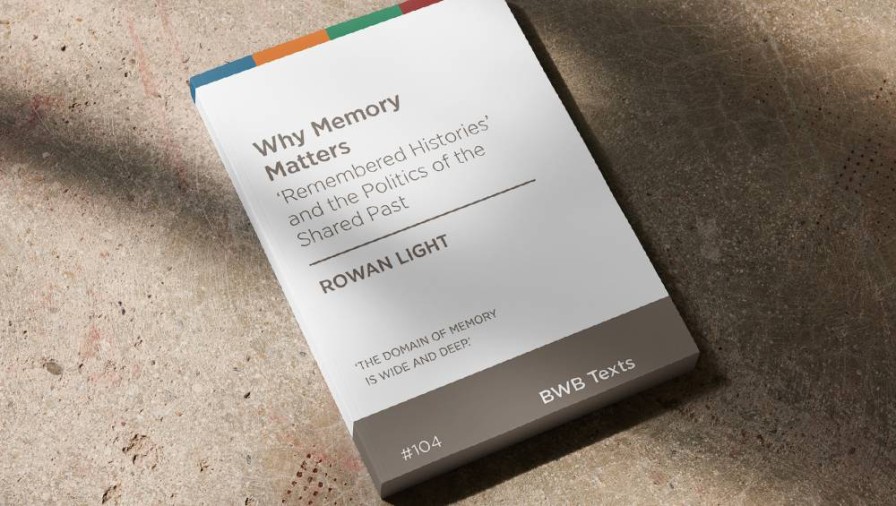
Why Memory Matters: ‘Remembered histories’ and the politics of the shared past, by Rowan Light (BWB Text).
Nevil Gibson is a former editor at large for NBR. He has contributed film and book reviews to various publications.
This is supplied content and not commissioned or paid for by NBR.
Sign up to get the latest stories and insights delivered to your inbox – free, every day.